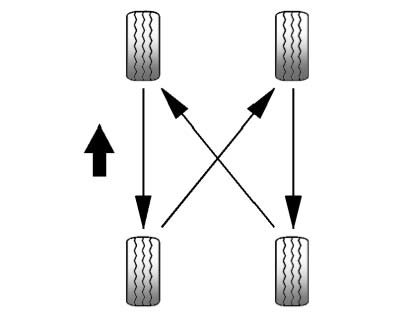Tire Rotation
Tires should be rotated every 12 000 km (7,500 mi). See Scheduled Maintenance .
Tires are rotated to achieve a uniform wear for all tires. The first rotation is the most important.
Any time unusual wear is noticed, rotate the tires as soon as possible and check the wheel alignment. Also check for damaged tires or wheels. Also check for damaged tires or wheels. See When It Is Time for New Tires and Wheel Replacement .

Use this rotation pattern when rotating the tires.
Do not include the compact spare tire in the tire rotation.
Adjust the front and rear tires to the recommended inflation pressure on the Tire and Loading Information label after the tires have been rotated See Tire Pressure and Vehicle Load Limits .
Reset the Tire Pressure Monitor System. SeeTire Pressure Monitor Operation .
Make certain that all wheel nuts are properly tightened. See “Wheel Nut Torque” under Capacities and Specifications .
![]() WARNING
WARNING
Rust or dirt on a wheel, or on the parts to which it is fastened, can make wheel nuts become loose after time. The wheel could come off and cause an accident. When changing a wheel, remove any rust or dirt from places where the wheel attaches to the vehicle. In an emergency, a cloth or a paper towel can be used; however, use a scraper or wire brush later to remove all rust or dirt.
Lightly coat the center of the wheel hub with wheel bearing grease after a wheel change or tire rotation to prevent corrosion or rust build-up. Do not get grease on the flat wheel mounting surface or on the wheel nuts or bolts.
See also:
Replacing Brake System Parts
The braking system on a vehicle is
complex. Its many parts have to be
of top quality and work well together
if the vehicle is to have really good
braking. The vehicle was designed
and tested ...
Hill Start Assist (HSA)
This vehicle has a Hill Start Assist
(HSA) feature, which may be useful
when the vehicle is stopped on a
grade. This feature is designed to
prevent the vehicle from rolling,
either forward o ...
Hitches
Use the correct hitch equipment. See your dealer or a hitch dealer for assistance.
. The rear bumper on the vehicle is not intended for hitches. Do not attach rental
hitches or other bumper-type hi ...


